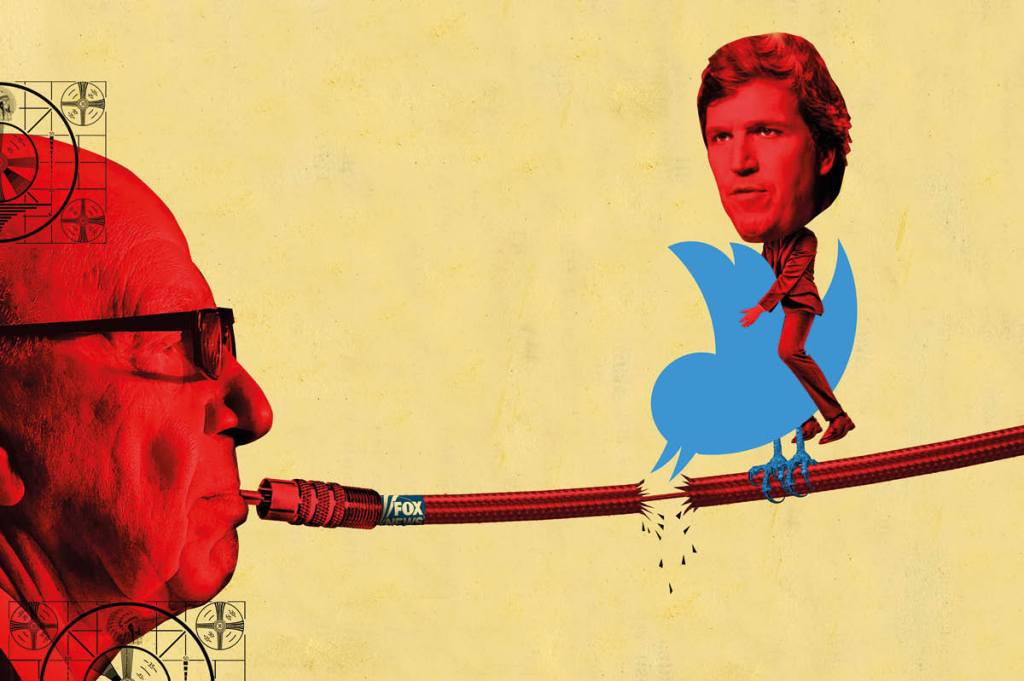Tucker Carlson’s six years on Fox News seem to have artificially extended the life, and relevance, of cable news itself. While he was there, the top-rated host in the medium brought in an entirely new audience: young people, especially young men. He not only drew the largest number of viewers in the coveted 25-54 demographic, he took in the top rank for Democrats in that age group too.
But even Carlson knew cable news was a dying model, one that had lasted longer than anyone expected, as he told me when I spoke to him for my upcoming book, Tucker.
“I really do think the cable news business has a limited future,” Carlson said, two weeks after his show was abruptly pulled off the air. “It’s too obviously controlled. It’s like Google — it’s just become too clear that there’s a certain selection of stories that are allowed, and a very thick file of stories that are not allowed. And I think people have come to understand that, and it’s just not sustainable.”
If Fox News’s ratings are anything to go by, then Carlson’s departure might help speed up that demise. For millions of frustrated viewers, he was the reason they kept watching Fox News. To a cynical audience, his presence was a saving grace: if NewsCorp let him speak, and speak so freely, they can’t be that bad, they thought.
;768:[300×250,336×280,320×100];0:[300×250,320×100,320×50]”]That’s done now. The backlash against Fox after it pulled the plug on Carlson has made the mountains of free Bud Light piling up in a Piggy Wiggly parking lot look quaint by comparison: total Fox viewership is down nearly 40 percent from the same time last year, and has tanked a whopping 62 percent in the key demographic.
What Carlson gave his viewers that no one else could was simple: authenticity. Cable news, and television in general, is an inherently fake place — the whole thing is nothing but cunning and deception — made more grotesque by so many scripted individuals and onscreen bells and whistles.
“I really think people are on to it, don’t you?” Carlson said to me, smoking a cigar in the tiny garden outside his part-time home on Florida’s Gulf Coast. “I see these clips of people on podcasts or just taking video of themselves on Twitter, and you can tell when someone’s really telling the whole truth. It’s obvious right away. Maybe I don’t agree with the person, but I can see this person is not lying, he’s saying what he really thinks, and that’s immediately perceptible. You can tell when someone’s lying to you or when someone’s shading the truth or trying to spin you. And there’s a lot of artifice in television.”
‘You can tell when someone’s really telling the whole truth. It’s obvious right away’
People rightly wonder why Fox would sacrifice their biggest star and ratings juggernaut. The answer is simple, Carlson’s executive producer, Justin Wells, told me. The executives, having survived other prominent departures from the network — Bill O’Reilly, Lou Dobbs, Megyn Kelly — are totally out of touch with their audience and the shifting media landscape.
;768:[300×250,336×280,320×100];0:[300×250,320×100,320×50]”]“I don’t think they ever understood that it wasn’t just a random cable news show like Laura Ingraham or Chris Hayes; Tucker Carlson is a movement. I mean, you didn’t just lose Harris Faulkner from Outnumbered. It’s ridiculous that they don’t understand the difference. But they really didn’t realize what they had,” Wells explained. “They never realized that the Tucker brand was as substantial as theirs.”
The fallout appears to confirm this. Newsmax, Fox’s very junior competitor, is now beating CNN in some primetime slots. And Fox’s ratings are in free fall. Carlson, it is becoming increasingly apparent, propped up the entire evening lineup. His show was appointment viewing for millions of Americans who have felt a chasm in their nightly routines since he got the chop.
I used to be a regular on Fox News. But after announcing my biography of Tucker Carlson recently, I was also yanked from upcoming appearances. Why would anyone go on anyway? I wondered. What do you get out of it? Exposure? That’s one of my favorite jokes: “Headline: Writer dies from exposure.” Perhaps “prestige” is a better word for what people think they will get from cable news. For conservatives, Fox is still king of the prestige economy, but that’s about it.
During seven years of being a regular on Fox’s most popular primetime shows, I learned long ago such appearances hardly translate into much practical value. The reason I always said “yes” wasn’t financial. I’ve never been paid a cent by Fox News. But a book plug would generate some sales — nothing to write home about, but it was something. Also, I simply liked the personalities, on-air and off, that I dealt with. I figured, sure, why not, I’ll sacrifice an evening for your show. Guess it’s a warm plate of prestige for dinner tonight!
An appearance on Gutfeld!, where I was a regular since the month it launched two years ago, could mean giving your entire afternoon over to Fox and walking away with maybe a hundred new followers on Twitter. Compare that to firing off one real banger of a tweet in the middle of the night — you could get 10,000 new followers. For all the grandeur and pomp around cable news, people simply aren’t watching. And, if they are, only passively.
The exception is our leaders. They care desperately about what happens on cable, which is why Carlson’s cancellation felt like a death for so many faithful viewers: Washington tends to not mind what the proles are up to on Twitter or podcasts. But Fox viewers knew Carlson had leaders’ ears. And Republicans feared him far more than Democrats. So a death had occurred; it was the end of a civil libertarian perspective, the departure of a dissenting voice against the uniparty in America’s corporate-approved, official discourse. Now, Washington could safely be assured, Carlson would be just another weirdo on the internet.
;768:[300×250,336×280,320×100];0:[300×250,320×100,320×50]”]Fox News honchos have still not given Carlson a reason for removing his show, though he suspects he knows what happened. At the time of writing he’s still a Fox News employee, taking home an ungodly-high salary to sit around and not have a program. His contract is set to expire after the next presidential election. Reports have it he’s preparing for a legal fight with the network.
The paradox of Tucker’s success at Fox was that, in this most corporate of settings, his distrust of corporatism is exactly what made him so popular and unique — and his show such a success. His appeal expanded across the political spectrum. Carlson fans come from the most unlikely of places, including Venezuela’s socialist dictator Nicolás Maduro, as I found out researching my book. Carlson wasn’t just a talk-show host, as he describes himself with a note of self-deprecation, but a figurehead for the incredible shake-up that has rocked American politics over the last decade or so. It’s a complete paradigm shift; the traditional ideas of left and right, Democrat and Republican, no longer hold. Not that the cable news executives seem to have noticed.
Tucker was also a bridge between new media and the boomer-tube, routinely covering topics that only people who spend a lot of time in obscure corners of the internet would be aware of. His name trended nightly on Twitter, which cannot be said of any other cable news personality. He brought the internet to cable news and cable news to the internet.
He brought the internet to cable news and cable news to the internet
“Things are changing in a really, really deep way. Not in a bullshit way. Not in a ‘Oh, more Hispanics are voting for Trump,’ shallow way, but there’s actually some huge changes underway, the outlines of which are unknown to me,” Carlson told me candidly.
Whether his departure will upset Fox’s antiquated view of itself has yet to be seen. And precious few Americans seem to care, while millions more eagerly wait to see what exactly Tucker Carlson, newly and completely unbound, looks like.
This article is taken from The Spectator’s July 2023 World edition.
;768:[300×250,336×280,320×100];0:[300×250,320×100,320×50]”]
























